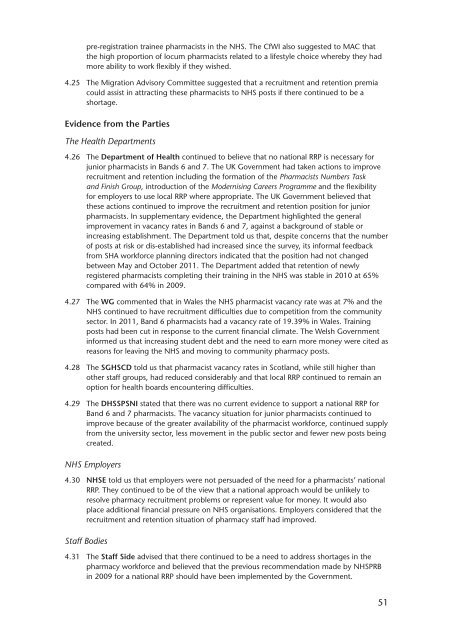NHS pay review body: twenty-sixth report 2012 - Official Documents
NHS pay review body: twenty-sixth report 2012 - Official Documents
NHS pay review body: twenty-sixth report 2012 - Official Documents
Create successful ePaper yourself
Turn your PDF publications into a flip-book with our unique Google optimized e-Paper software.
pre-registration trainee pharmacists in the <strong>NHS</strong>. The CfWI also suggested to MAC that<br />
the high proportion of locum pharmacists related to a lifestyle choice whereby they had<br />
more ability to work flexibly if they wished.<br />
4.25 The Migration Advisory Committee suggested that a recruitment and retention premia<br />
could assist in attracting these pharmacists to <strong>NHS</strong> posts if there continued to be a<br />
shortage.<br />
Evidence from the Parties<br />
The Health Departments<br />
4.26 The Department of Health continued to believe that no national RRP is necessary for<br />
junior pharmacists in Bands 6 and 7. The UK Government had taken actions to improve<br />
recruitment and retention including the formation of the Pharmacists Numbers Task<br />
and Finish Group, introduction of the Modernising Careers Programme and the flexibility<br />
for employers to use local RRP where appropriate. The UK Government believed that<br />
these actions continued to improve the recruitment and retention position for junior<br />
pharmacists. In supplementary evidence, the Department highlighted the general<br />
improvement in vacancy rates in Bands 6 and 7, against a background of stable or<br />
increasing establishment. The Department told us that, despite concerns that the number<br />
of posts at risk or dis-established had increased since the survey, its informal feedback<br />
from SHA workforce planning directors indicated that the position had not changed<br />
between May and October 2011. The Department added that retention of newly<br />
registered pharmacists completing their training in the <strong>NHS</strong> was stable in 2010 at 65%<br />
compared with 64% in 2009.<br />
4.27 The WG commented that in Wales the <strong>NHS</strong> pharmacist vacancy rate was at 7% and the<br />
<strong>NHS</strong> continued to have recruitment difficulties due to competition from the community<br />
sector. In 2011, Band 6 pharmacists had a vacancy rate of 19.39% in Wales. Training<br />
posts had been cut in response to the current financial climate. The Welsh Government<br />
informed us that increasing student debt and the need to earn more money were cited as<br />
reasons for leaving the <strong>NHS</strong> and moving to community pharmacy posts.<br />
4.28 The SGHSCD told us that pharmacist vacancy rates in Scotland, while still higher than<br />
other staff groups, had reduced considerably and that local RRP continued to remain an<br />
option for health boards encountering difficulties.<br />
4.29 The DHSSPSNI stated that there was no current evidence to support a national RRP for<br />
Band 6 and 7 pharmacists. The vacancy situation for junior pharmacists continued to<br />
improve because of the greater availability of the pharmacist workforce, continued supply<br />
from the university sector, less movement in the public sector and fewer new posts being<br />
created.<br />
<strong>NHS</strong> Employers<br />
4.30 <strong>NHS</strong>E told us that employers were not persuaded of the need for a pharmacists’ national<br />
RRP. They continued to be of the view that a national approach would be unlikely to<br />
resolve pharmacy recruitment problems or represent value for money. It would also<br />
place additional financial pressure on <strong>NHS</strong> organisations. Employers considered that the<br />
recruitment and retention situation of pharmacy staff had improved.<br />
Staff Bodies<br />
The<br />
4.31 Staff Side advised that there continued to be a need to address shortages in the<br />
pharmacy workforce and believed that the previous recommendation made by <strong>NHS</strong>PRB<br />
in 2009 for a national RRP should have been implemented by the Government.<br />
51
















